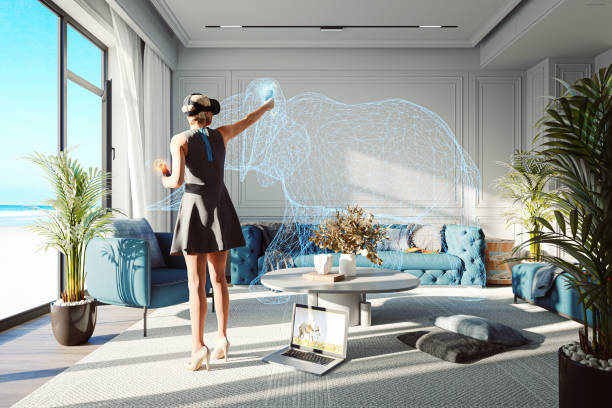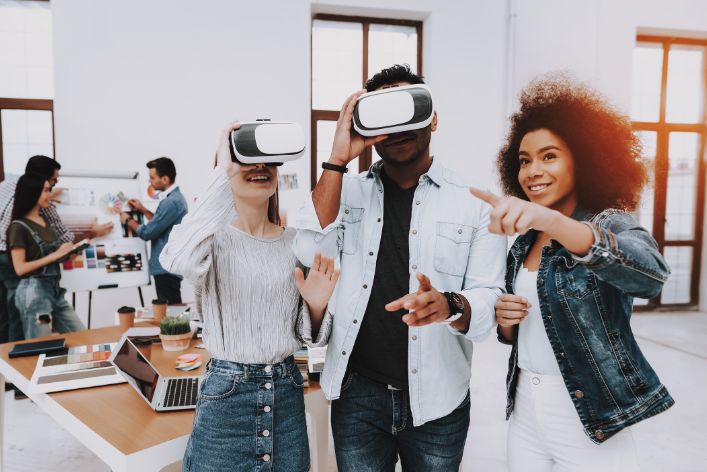Virtual reality is changing our world.
You’re unlikely to visit Mars, swim with dolphins, compete in an Olympic 100-meter dash, or perform on stage with the Rolling Stones.
However, if virtual reality lives up to its potential, you may be able to perform all of these things—and many more—without ever leaving your house.
In contrast to our regular reality (the world in which we live), virtual reality involves replicating parts of our world or entirely imagined worlds using high-performance computers and sensory equipment.
Virtual reality (VR) technology is rapidly expanding its influence in fields such as education, science, commerce, manufacturing, and more.
It allows a person to do tasks in a digital environment while still feeling as if they are in a physical one.
Humans are visual creatures, and the display technology that separates immersive Virtual Reality systems from standard user interfaces is frequently the most significant distinction.
HTC Vive, Oculus Rift, and PlayStation VR (PSVR) are the most popular Virtual Reality companies.
At this stage of development, users must wear a VR headset or haptic glove to interact with this type of artificial world.
As technology advances, virtual reality is predicted to play an increasingly crucial technical role in the construction of immersive metaverse experiences.
What is Virtual Reality?
Virtual reality is the use of computer modelling and simulation to allow a human to interact with an artificial three-dimensional visual or other sensory environment.
VR applications immerse the user in a computer-generated environment that mimics reality through interactive equipment such as goggles, headsets, gloves, or bodysuits that send and receive information.
A VR helmet user with a stereoscopic screen sees animated pictures of a simulated environment in a conventional VR style.
Motion sensors sense the user’s movements and modify the view on the screen accordingly, frequently in real time, to give the sensation of “being there.”
As a result, a user can walk around a simulated suite of rooms, changing perspectives and viewpoints that are convincingly in sync with his own head turns and steps.
The user can even pick up and handle objects he sees in the virtual environment while wearing data gloves with force-feedback devices that offer touch.
Read: Virtual Reality in Love: How VR Is Enhancing Relationships

Virtual Reality (VR) vs Augmented Reality (AR)?
Augmented reality is more efficient as a branding and gaming tool than virtual reality since it can be accessed by almost everyone with a smartphone.
By displaying virtual graphics and characters through a phone’s camera or video viewer, AR transforms the dull, physical world into a colourful, visual one.
AR simply enhance the user’s real-life experience.
The technology allows you to walk around freely while projecting visuals onto anything you’re looking at.
AR apps and games, such as Pokemon Go, use your phone’s camera to detect your surroundings and overlay additional information on top of it on the screen, extending the concept to smartphones.
AR displays can be as simple as a data overlay that shows the time or as complex as a holograph floating in the middle of the room.
The major differences between AR and VR are that;
- AR uses a real-world setting while VR is completely virtual.
- VR requires a headset device, but AR can be accessed with a smartphone.
- AR users can control their presence in the real world; the system controls VR users.
- AR enhances both the virtual and real-world while VR only enhances a fictional reality.
Read: Future of Immersive Gaming Experiences: Virtual Reality’s Role
Applications of Virtual Reality
Here are a few ways virtual reality will change the way we do certain things in society.
Retail
In the not-too-distant future, you’ll be able to try on anything you want in the virtual world and get a genuine feel of how it appears on you.
This trend is already underway with augmented reality at several eyewear retailers, but we should expect to see much more VR in the retail space in the future.
This will almost certainly increase the pressure on brands to deliver top-notch VR shopping experiences.
Education and Training
Virtual reality is already changing the way people learn and train.
For example, Hilton’s virtual reality training program uses computer graphics and 360-degree video to replicate duties such as housekeeping, room service, and front desk work.
Realistic field trips, immersive history simulations, art lectures, and biology adventures (including VR dissection) will all be used in the classroom with VR.
Entertainment and Sports
Have you ever fantasized about watching a concert or a sporting event from the comfort of your own home?
Virtual reality will make this practical very soon.
Marshmello and Travis Scott, two electronic DJs, have already hosted virtual gigs in Fortnite, with many more on the way.
We Design & Develop Websites, Android & iOS Apps
Looking to transform your digital presence? We specialize in creating stunning websites and powerful mobile apps for Android and iOS. Let us bring your vision to life with innovative, tailored solutions!
Get Started TodayVRChat is a new social VR platform that allows users to communicate and hang out with each other using 3D lip-synced avatars.
You can even go to a virtual church.
Healthcare
Virtual reality will significantly impact how doctors detect and treat diseases and illnesses.
VR is currently being utilized to diagnose glaucoma, schizophrenia, and Alzheimer’s illness.
It’s also starting to gain traction as a treatment for PTSD, anxiety disorders, dementia, and autism.
Virtual reality can even aid in completing physical rehabilitation following an illness or injury!
Travel and Hospitality
Hotels use virtual reality as a marketing tool by developing immersive experiences that entice new guests.
As consumers, we can also take virtual reality excursions to sites like Zion National Park, Rio de Janeiro, Rome, and Dubai.
We’ll soon be able to travel nearly anywhere on the globe simply by putting on a virtual reality headset.
The Metaverse
This is one aspect of virtual reality that we just cannot ignore.
Users can collaborate and play in the metaverse, which is a unified, persistent digital world.
Because the metaverse focuses on producing ever more sophisticated immersive experiences, virtual reality is a key component in its development.
The metaverse has the potential to bring together all of the sectors and activities mentioned above into a single connected location where users can access a variety of experiences.
Virtual reality will pervade every aspect of our lives as technology advances and new applications are discovered, and it will certainly become a daily event for many of us.
Read: Real Estate Virtual Tours Revolutionizing Online Listings

The Future of VR
All of this is in response to a question with no answer.
It’s for everything is the simplest but least pleasing response.
Beyond gaming and other forms of interactive entertainment, virtual reality has potential applications in education and design, as well as for both telecommuting and office work.
Social VR is more engaging than any digitally mediated conversation we’ve ever experienced and more impacting, thanks to “embodied presence”—you occupy an avatar in virtual space.
Virtual experiences are stored and retrieved in our brains like any other experiencing memory, from our reactions to our environment to the quality of our relationships.
Technology is becoming less expensive and more widely available.
Because of the possibilities of virtual reality, we may expect to see many more new uses for technology in the future and perhaps a fundamental change in how we interact and work.
Read: How VR is Transforming Online Learning for Students
Conclusion
In summary, virtual reality is on the brink of revolutionizing our lives in ways we could only imagine.
As VR technology advances, its applications will span across education, entertainment, healthcare, and more.
This immersive technology promises to simulate reality and enhance and redefine our experiences, from virtual travel to interactive learning.
With evolving tech and decreasing costs, VR’s potential to transform daily life is immense.
As we step into this new era, the possibilities are endless.
Embracing VR could well reshape how we learn, play, and interact, making the extraordinary accessible from the comfort of our own homes.
Before You Go…
Hey, thank you for reading this blog post to the end. I hope it was helpful. Let me tell you a little bit about Nicholas Idoko Technologies.
We help businesses and companies build an online presence by developing web, mobile, desktop, and blockchain applications.
We also help aspiring software developers and programmers learn the skills they need to have a successful career.
Take your first step to becoming a programming expert by joining our Learn To Code academy today!
Be sure to contact us if you need more information or have any questions! We are readily available.
We Design & Develop Websites, Android & iOS Apps
Looking to transform your digital presence? We specialize in creating stunning websites and powerful mobile apps for Android and iOS. Let us bring your vision to life with innovative, tailored solutions!
Get Started TodayPut Your Tech Company on the Map!
Get featured on Nicholas Idoko’s Blog for just $200. Showcase your business, boost credibility, and reach a growing audience eager for tech solutions.
Publish Now









